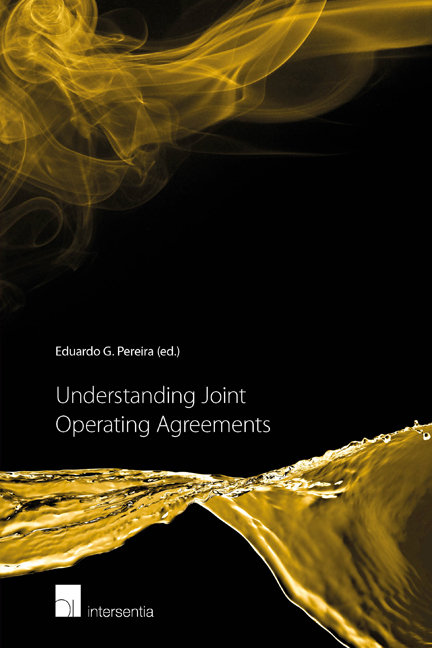Book contents
- Frontmatter
- Contents
- List of Abbreviations
- List of Authors
- Introduction
- PART I CONSIDERATIONS PRIOR TO ENTERING INTO A JOA
- PART II SETTING UP A JOA
- PART II.A GENERAL CONSIDERATIONS
- 9 The Scope of the JOA
- 10 Addressing Health, Safety and Environment Matters
- 11 Insurance: What Should Be Insured, Who Should Be Liable For It and to What Extent?
- 12 Transfer of Interest and Change of Control in JOAs
- 13 Governing Law and Dispute Resolution Clauses in JOAs
- 14 The Challenges of Implementing an Exclusive Operation
- PART II.B CONTROL OF OPERATIONS AND EXPENDITURES
13 - Governing Law and Dispute Resolution Clauses in JOAs
from PART II.A - GENERAL CONSIDERATIONS
Published online by Cambridge University Press: 15 December 2017
- Frontmatter
- Contents
- List of Abbreviations
- List of Authors
- Introduction
- PART I CONSIDERATIONS PRIOR TO ENTERING INTO A JOA
- PART II SETTING UP A JOA
- PART II.A GENERAL CONSIDERATIONS
- 9 The Scope of the JOA
- 10 Addressing Health, Safety and Environment Matters
- 11 Insurance: What Should Be Insured, Who Should Be Liable For It and to What Extent?
- 12 Transfer of Interest and Change of Control in JOAs
- 13 Governing Law and Dispute Resolution Clauses in JOAs
- 14 The Challenges of Implementing an Exclusive Operation
- PART II.B CONTROL OF OPERATIONS AND EXPENDITURES
Summary
INTRODUCTION
A JOA is a contractual framework that regulates the relationship between participants to major oil and gas projects. These projects bring together several actors, who each play different roles in the exploration, development and production of the projects. A JOA permits the allocation of risks and costs between the participants and determines the way the production and profit will be shared.
JOAs are most often international in nature, as oil and gas projects usually necessitate cooperation between state entities and foreign private parties. Indeed, states will usually entrust the task of developing and administering the concession to a public entity established for this purpose. This public entity will then enter into a joint venture with a private, usually foreign, entity, which will operate the concession and conduct the day-to-day business of the joint venture.
In addition to the operator, who is in charge of the day-to-day management, a JOA usually involves private parties who will essentially have a supervisory and investing role, namely the non-operator(s). These non-operators – who may be of several different nationalities – will participate in the operation of the JOA and impact, or be impacted by, the operator ‘ s performance under the JOA, as the operator enters into an intricate set of agreements, such as sub-contracts with local or foreign suppliers. Furthermore, at least part of the funding of oil and gas projects typically comes from private actors who may or may not be parties to the JOA. All these private parties (operators or non-operators) share operational and financial responsibilities in accordance with their respective participative interest in the project.
JOAs thus organise long-term cooperation between parties whose interests may diverge in several respects at different stages of the project. A well-drafted and thought-through agreement is crucial to establish a clear, transparent relationship that will permit the parties to conduct joint operations on a lasting and stable basis. Careful drafting is also important to avoid disputes in the future.
- Type
- Chapter
- Information
- Understanding Joint Operating Agreements , pp. 247 - 292Publisher: IntersentiaPrint publication year: 2016



